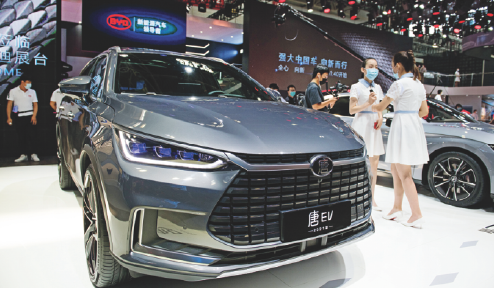Automakers drive up prices


Rising raw material costs cause electric carmakers to hike up their prices
Electric carmakers including Tesla and BYD have hiked prices on some of their models in China citing rising raw material costs, but company executives remain optimistic on the sector's long-term prospects.
Tesla upped its prices three times, from March 10-17, on its popular Model 3 sedan and Model Y SUV.Some model variants from the US electric vehicle maker now cost as much as 30,000 yuan ($4,718) more than they did just eight days ago.
Elon Musk, CEO of Tesla, said the company is facing significant inflationary pressure in raw materials and logistics.
Last week, Chinese carmakers BYD and Chery hiked prices on some of their models, also citing rising raw material costs.
The price tags for some BYD models including its Dynasty series have been increased by 3,000-6,000 yuan.
This is the second time that BYD has raised its prices this year, with the first increase in January.
The Anhui province-based Chery has upped the prices of its Ants and Ice Cream series by 3,000-7,000 yuan, both of which are popular and more affordable mini-sized electric models.
Prices of metals used in cars have been soaring, including aluminum used in bodywork, nickel and lithium used in power electric batteries and palladium used in catalytic converters in combustion-powered vehicles.
Statistics from 100PPI, a Chinese company that tracks bulk commodity prices, show that battery-grade lithium carbonate was priced at 480,000-522,000 yuan per metric ton on Thursday, almost 10 times its price in 2021.
Battery-grade cobalt has seen its price in the international market soar by 119 percent from January 2020 to January this year.
Ongoing chip shortages may worsen the situation. Japanese automotive chipmaker Renesas Electronics has temporarily halted production at two semiconductor plants and partially stopped output at a third following a powerful earthquake in Japan last week.
Among them is its Naka plant in Ibaraki prefecture, which supplies chips to auto companies around the world that have already had their production capacity badly affected because of chip shortages since late 2020.
Besides expensive raw materials and a scarcity of chips, Chinese EV makers also have to contend with the recent cutting of government subsidies.
The Chinese government has provided financial incentives since 2009 to spur the development of new energy vehicles. However, it has begun phasing out the subsidies as the sector has grown in maturity.
Last year, more than 3.52 million electric cars and plug-in hybrids were sold in China, up 157 percent year-on-year, accounting for 13.4 percent of total vehicle sales, according to the China Association of Automobile Manufacturers.
In January, the government cut subsidies on NEVs sold this year by 30 percent compared with those in 2021, with zero financial incentives set to start in 2023.
Zeng Qinghong, chairman of GAC Group, said NEV makers are facing tremendous pressure because of the rising costs and subsidy cuts, but in the long run they will be able to reduce their costs and scale up production.
GAC is the parent company of GAC Aion, a popular EV maker based in Guangzhou, Guangdong province.
Earlier this month, Zeng called for the government to extend its subsidies for one or two more years, while acknowledging that carmakers need to improve their competitiveness through their own products and services.
Cui Dongshu, secretary-general of the China Passenger Car Association, said the recent price hikes might create some buyer hesitancy in the market, but the success of the sector is inevitable in China and other parts of the world.
The association estimates that as many as 5.5 million NEVs will be sold in China this year, up from 3.5 million in 2021.
The sector has started out 2022 pretty well, with total of 765,000 electric cars and plug-in hybrids sold in the first two months, up 150 percent from the same period last year.
Volkswagen AG, the world's second-largest carmaker, said last week it aims to sell at least twice as many EVs in China as it did in 2021.
Last year, the German auto giant sold 93,000 electric cars in the country, four times its figure for 2020.




































